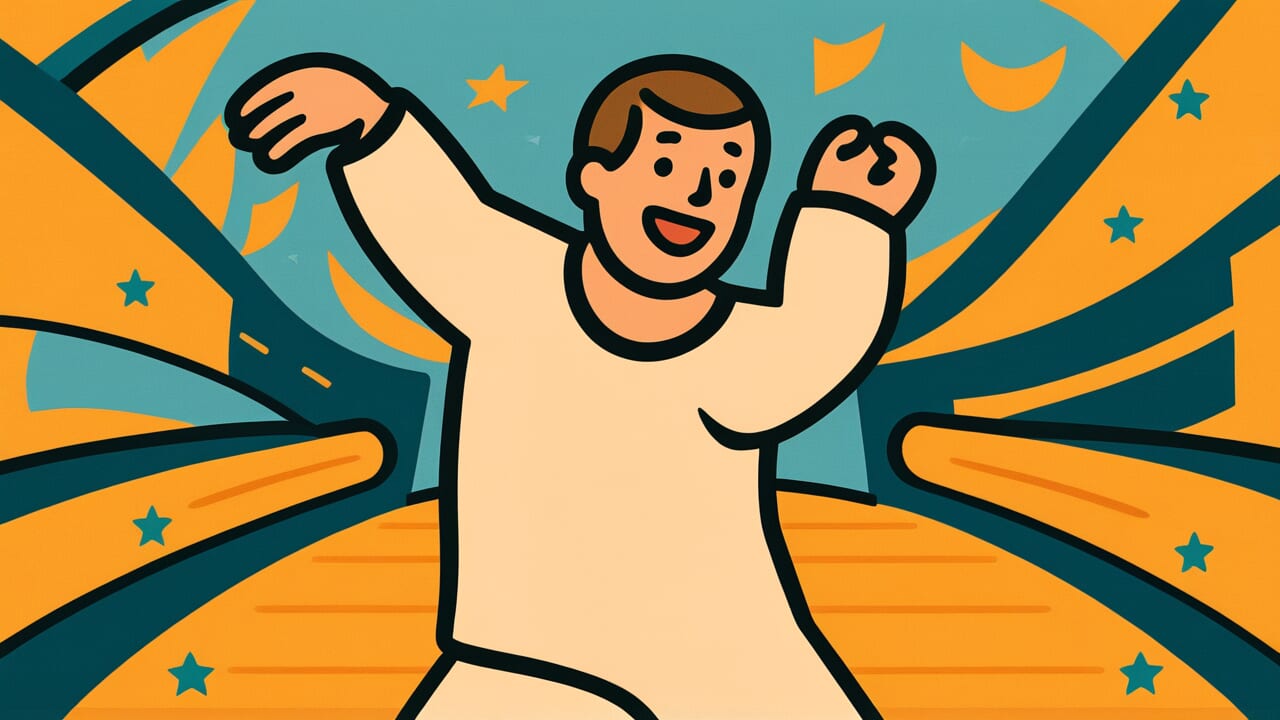How to Read “When people dance, dance with them”
Hito no odoru toki wa odore
Meaning of “When people dance, dance with them”
“When people dance, dance with them” means you should act in harmony with others when they are doing something. It teaches the importance of reading the atmosphere and matching your pace with those around you.
This proverb is used in situations where maintaining harmony and avoiding isolation within a group is important. For example, it warns against standing aside when everyone at work is cooperating on a task.
It also applies when you remain cold and distant at a celebration while everyone else is enjoying themselves.
Today, people understand this expression as teaching the importance of cooperation and social skills. Having your own will matters, but you also need flexibility to adapt to others depending on the time and place.
This proverb teaches us about balance and good judgment.
Origin and Etymology
No clear written records explain the origin of this proverb. However, we can make interesting observations from how the phrase is constructed.
Let’s focus on the act of “dancing.” In Japan since ancient times, dancing together in groups has been important at festivals and ceremonies. Bon dances and festival dances were not just for individual enjoyment.
They had meaning as participation as a member of the community. If one person refused to dance, they would ruin the atmosphere. Conversely, if someone danced alone when no one else was dancing, this would also be inappropriate behavior.
The expression “When people dance, dance with them” is thought to condense the wisdom of such group behavior. Through the concrete act of dancing, it teaches the importance of harmony with others.
This phrase also contains the element of “time.” It doesn’t simply say “if people dance, dance.” By expressing it as “when people dance,” it emphasizes the importance of timing.
The importance of judging the right moment and acting accordingly is packed into this short phrase. We can say that survival wisdom cultivated within Japanese group culture is expressed through the familiar act of dancing.
Usage Examples
- At my new workplace, I decided to first learn the methods around me with the spirit of “When people dance, dance with them”
- He understands “When people dance, dance with them” and never ruins the atmosphere at any gathering
Universal Wisdom
Behind the long transmission of the proverb “When people dance, dance with them” lies the truth that humans are fundamentally social creatures. We cannot live alone and always exist within relationships with others.
The universal wisdom this shows is the delicate balance between individual and group. Humans have a desire to assert themselves, but also hold fear of being excluded from the group.
We constantly waver between these two conflicting emotions.
Our ancestors deeply understood this human nature. They realized that to live within a group, you sometimes need the wisdom to restrain yourself and adapt to your surroundings.
This was never about killing individuality. It was a technique for finding your place within a larger harmony.
Also, this proverb contains the concept of “time.” In life, there are times to dance and times to remain quiet. Discerning between them becomes the power to smooth human relationships and survive in society.
No matter how times change, as long as people gather and live together, this wisdom will never fade. It is truly a universal teaching that expresses the unchanging essence of human sociality through the familiar act of dancing.
When AI Hears This
The more people dancing, the more beneficial it becomes for you to dance too. This is the essence of coordination equilibrium in game theory. For example, in a group of 100 people, if 51 or more dance, an atmosphere emerges that “dancing is correct.”
The remaining people have no choice but to dance. Conversely, if 50 or fewer dance, not dancing is safer. This proverb shows not simple conformity of “matching the majority,” but rational judgment in situations where others’ actions affect your own interests.
Interesting is the phenomenon called information cascade. When the first few people start dancing, subsequent people infer “perhaps they know some good information” and follow. Even if their own judgment says they shouldn’t dance, they prioritize the information of predecessors’ actions.
Experiments show that when just three people make the same choice, over 75 percent of the fourth person onward abandon their own judgment and follow.
This mechanism is prominent in financial markets. When stock prices start rising, investors emphasize the fact that “other investors are buying” over the company’s actual condition and rush to buy.
Mathematical models of bubbles calculate that if 60 percent of participants move, the remaining 40 percent must also follow as a rational judgment. Here exists a structure where the seemingly irrational behavior of dancing actually becomes the probabilistically optimal solution.
Lessons for Today
What this proverb teaches us today is the value of flexibility and adaptability. In modern society where globalization advances and diverse values intersect, the ability to harmonize with surroundings according to situations becomes increasingly important.
You must maintain your own thoughts while doing so.
Particularly noteworthy is that this proverb demands not “blind following” but “situational judgment.” The expression “when people dance” has the premise of first observing your surroundings and discerning what kind of time it is now.
This is an indispensable skill in modern business scenes and community activities alike.
When you enter a new environment, try observing your surroundings first. There exists a unique rhythm and culture in that place. You don’t need to understand everything from the start. First adapt to those around you, then gradually understand that environment.
And don’t forget this. Harmonizing does not mean losing yourself. Rather, by building good relationships with your surroundings, you create a foundation for expressing your own individuality.
When people dance, dance with them. And when the time comes, you can take your own steps.



Comments